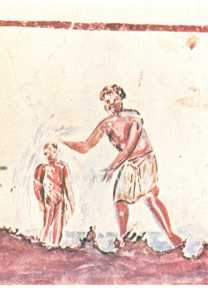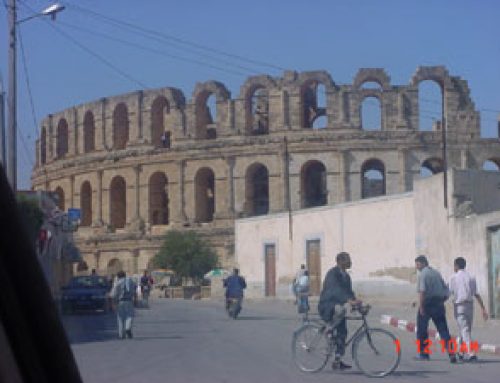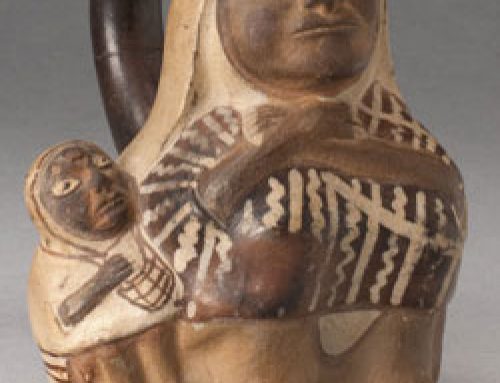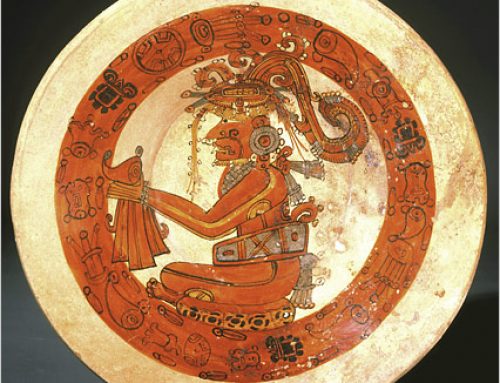
Hadrian’s Pantheon from the outside. Built in the early 100s AD
In some ways Roman religion is a lot like Greek religion, but in other ways it is very different. Like the Greeks, the Romans thought that there were many gods, and that these gods each controlled different parts of the world: storms, the ocean, marriage, blacksmithing, and so forth.
The Romans were particularly interested in legal contracts, and much less interested in balance than the Greeks. One important Roman idea about their gods was “do ut des”, which is Latin for “I give so that you will give.” People should sacrifice to the gods, so that the gods would help them in return. At first this meant animal sacrifice, but by the time the Roman Republic became the Roman Empire, about 30 BC, mostly Romans – like everyone else in Eurasia – had stopped sacrificing animals and were sacrificing incense or spices instead.

A Roman incense sacrifice
The chief of the gods, for the Romans, was Jupiter. Jupiter’s name is related to the name of the Greek god Zeus, and Jupiter is similar to Zeus in many ways. They are both sky gods who throw lightning bolts when they are angry. The Roman goddesses Juno and Minerva correspond more or less to the Greek goddesses Hera and Athena. The conquered Africans(with the Egyptians), Europeans, and West Asian people like the Jews continued to worship their own gods, as well as adopting Roman gods. The Roman leaders didn’t have any problem with people worshiping as many gods as they liked.
At first the Roman gods were separate from Greek gods, although distantly related because both groups worshipped Indo-European gods. Later on, though, as the Romans met more Etruscans and Greeks and began to admire the Greeks more and more, the Romans adopted many Greek gods as their own and began to worship them as well. One early example is the twin gods Castor and Pollux. As the Roman Empire expanded, people also began to worship the gods of other conquered areas, like the Egyptian goddess Isis and the Syrian god Mithra.

Emperor Maximian sacrifices incense to the goddess Diana (Piazza Armerina, Sicily, ca. 310 AD)

A Jewish tombstone from the Roman Empirewith Greek writing and menorahs (Vatican Museum, Rome)
For the Romans, as well, their emperors were gods, or something very close to gods, depending on who you asked. Generally in the eastern part of the Roman Empire, in Egypt and West Asia, people worshipped the emperors as gods. But in the western part, in Europe, people worshipped only the emperor’s guardian angel or something like that, not the emperor himself.
But not everybody in the Roman Empire worshipped the emperors, or even the traditional Roman gods. When the Romans conquered the Jews about 100 BC, the Jews continued to worship their own god according to their Commandments. And, soon after that, when people began to become Christians, they also refused to worship traditional Roman gods. The Roman government didn’t like it when the Jews and Christians refused to worship traditional Roman gods, but most of the time the Roman government put up with it (not always).

One of the earliest Christian baptism images, from the catacomb of St. Callisto in Rome (200s AD)
Christianity slowly got more and more normal until in 313 AD the Roman Emperor Constantine himself became a Christian, and after that most rich people in the Roman Empire became Christians. By 395 AD, the Roman Emperor Theodosius made it illegal not to be a Christian anywhere in the Roman Empire. Despite this law, however, only rich people and people in cities were really Christians at this time – it was after the fall of Rome before most of the country farmers – most people – became Christians.




